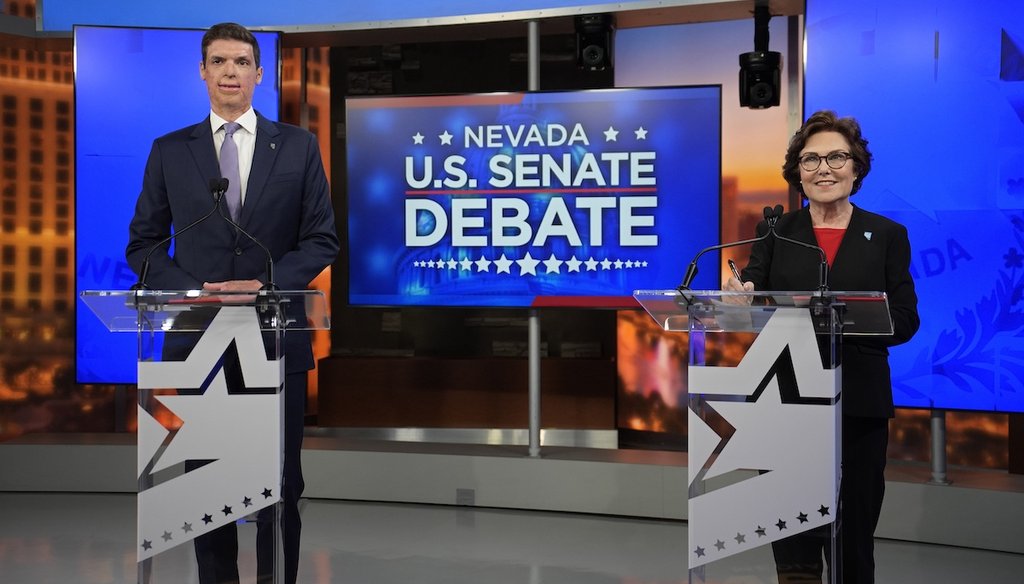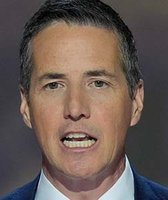Stand up for the facts!
Our only agenda is to publish the truth so you can be an informed participant in democracy.
We need your help.
I would like to contribute

Republican senatorial candidate Sam Brown, left, and Sen. Jacky Rosen, D-Nev., stand in a tv studio before a debate Thursday, Oct. 17, 2024, in Las Vegas. (AP)
U.S. Sen. Jacky Rosen, D-Nev., and Republican Sam Brown, a retired U.S. Army captain, sparred over abortion and immigration Oct. 17 in their only U.S. Senate debate before the Nov. 5 election. But the candidates found shared curiosity about outer space.
"I do think it’s important that we do our independent investigation," Rosen said in response to a question that asked whether Congress should investigate UFOs.
Brown, who served in Afghanistan before a 2008 injury, said he would "love to know what’s going on" and "never saw any sort of technology like that when I was in the service."
"I’m not sure I fully trust Congress to be able to figure it out," he said.
Both candidates expressed support for ending a tax on tips during Las Vegas debate, hosted by KLAS-TV, a CBS affiliate. But they diverged on the best approach for managing the southwest border and bickered about Brown’s abortion position.
Sign up for PolitiFact texts
Polls show Rosen, who was elected to the Senate in 2018, ahead of Brown, even as the battleground state remains a tight contest for former President Donald Trump and Vice President Kamala Harris.
Here’s a look at claims by Rosen and Brown, fact-checked:
Immigration
Brown called for deporting immigrants in the U.S. illegally, saying there are "13,000 murderers … that we just found out are here."
We rated a similar claim False. The public did just learn about that number, but it goes back decades.
In a September letter, Immigration and Customs Enforcement said there were 13,099 noncitizens convicted of homicide who are not in immigration detention. But the data represents people who entered the country in the past 40 years.
Many people are not in immigration detention because they’re serving sentences after convictions. Immigration law generally requires the people convicted of aggravated felonies, such as homicide, to be detained once they have served their sentences. But a Supreme Court ruling said people cannot be held indefinitely in immigration detention. So, people from countries that do not accept deportation flights must be released.
Rosen: Brown was against the Border Protection Act "before he could have even read it" and the bill "is endorsed by the Border Patrol union."
This is accurate.
Brown told The Messenger that he opposed the preliminary deal that Sen. James Lankford, R-Okla., was negotiating days before it was released. (The Messenger is now defunct, but HuffPost reported on Brown’s statement Jan. 31.)
"If Joe Biden was serious about solving the border crisis and human rights tragedy he created, he would immediately reinstate the Trump border policies that he ended," Brown said. "He wouldn’t wait for Congress."
A bipartisan trio of senators released the bill Feb. 4. Trump opposed the bill.
Brown said Feb. 5 on X that the bill should be rejected and would not "solve the border crisis."
The National Border Patrol Council — the U.S. Border Patrol’s union — endorsed the bill, which failed in the Senate on a 49-50 vote.
Brown said the Border Protection Act "would allow for 8 million people to come, guaranteed, to come across as asylum seekers. It would pay for their legal counsel. It would pay to fly people into our country illegally."
This number is inaccurate. The bipartisan Senate border security bill would have given the president emergency authority to bar most migrants from seeking asylum if unauthorized immigration at the border reached an average of 5,000 encounters a day during seven consecutive days. Encounters data tracks how many times officials stop migrants, not how many migrants are let in.
The number of encounters triggers the emergency authority, and the authority changes what happens when people try crossing the border. Before the authority is triggered, immigration law would continue to be enforced with a higher standard for asylum interviews, faster adjudication and increased detention space.
The bill would not have provided lawyers to all immigrants seeking asylum. It would have required and funded legal counsel for unaccompanied immigrant children younger than 13. It also would have provided a lawyer to immigrants whom a judge identifies as "incompetent" because of a mental disorder.
The bill did not mention creating a program to pay for people to fly in the U.S.
Abortion
Rosen: Brown "has a decade-long record of saying he is against any exceptions on abortion, even in the case of rape or incest. Not negotiable."
This is Half True.
During Brown's 2014 run for a Texas House of Representatives seat, he supported a 2013 Texas law, passed by Republicans, that bans abortion after 20 weeks. Statehouse Republicans rejected a Democratic-backed amendment to that law that would have included exceptions for rape or incest.
Rosen’s campaign has also pointed to a questionnaire during Brown's 2022 Senate run in which he said he supported exceptions to a ban on abortion only in cases of risk to the mother's life. Brown's campaign distanced itself from that survey in 2023, saying a campaign staffer filled it out without Brown's approval.
PolitiFact could not find evidence of Brown commenting on abortion exceptions for rape or incest until the day after he launched his campaign in 2023. He has since said he supports exceptions for rape or incest.
Before his current run for office, Brown's 2014 Texas campaign website said abortion was "not an issue of choice." He also chaired the Nevada Faith and Freedom Coalition, a spinoff of a national group whose founder said will support any legislation that limits abortion, including a total ban.
Brown has said during the campaign, including at the Oct. 17 debate, that he would not support a national abortion ban if elected. Brown has said abortion should be left to the states, though he opposes a Nevada ballot measure enacting constitutional protections for abortions.
"I also stand by Nevada's law that allows for abortion up to 24 weeks," Brown said at the debate. "I stand by and allow that we should allow for women to have exceptions for rape, incest and threat to life of the mother. Nevadans have made our law clear 34 years ago. I stand by that law and I would not vote for a national abortion ban."
Economy
Rosen: "Brown actually calls for higher interest rates. He said it wouldn't be pretty or easy. In fact, it would be painful."
This is missing context.
Brown made the comment during a May 10, 2022, Senate primary debate when the year-over-year inflation rate was 8.6%.
Brown said that "they should be raising rates at 2.5 points or more immediately to try and combat that."
Brown said that fixing the economy would not be "pretty or easy."
"But I'm talking about what we need to do is ensure that we're doing the right thing, even if it does cause temporary pain," Brown said. "The damage they're doing by this runaway spending is going to have a longer negative impact on our country than if we take the appropriate economic steps of raising interest rates."
Brown attacked Rosen in a Feb. 6 Breitbart piece for calling on the Federal Reserve to lower interest rates.
"She doesn’t understand economics — and it’s not her place to make that demand anyway," Brown said.
Brown’s campaign did not respond to a PolitiFact question about whether he still supported raising interest rates two years later.
Brown called Rosen "the deciding tiebreaking vote that has led to the increased costs."
This is Mostly False.
The vote in question was on the 2021 American Rescue Plan Act, Biden’s coronavirus pandemic relief bill. The $1.9 trillion plan, supported by only Democrats, included $1,400 direct payments to about 85% of Americans, $360 billion for state and local governments, and $242 billion in expanded unemployment benefits. Rosen voted for it, as did every Democrat in the chamber; Vice President Kamala Harris formally broke the tie rather than Rosen, per se.
As lawmakers worked on the measure, some economists, including Larry Summers, who directed the National Economic Council under former President Barack Obama, warned the bill would lead to inflation, and in retrospect, economists now widely agree that the law put too much money in Americans’ pockets when the pandemic had hampered global supply chains. This meant demand outstripped supply, leading prices to spike to about 9% higher than a year earlier by summer 2022.
However, most economists also agree that the American Rescue Plan exacerbated inflation but was not the sole cause. The supply chain shortages, economists say, ignited the inflation increase, and Russia’s 2022 invasion of Ukraine, which prompted an oil price spike and other trade interruptions, worsened it.
Yucca Mountain
Responding to a question from moderators on Yucca Mountain, Brown said, "I didn’t change my position."
Nevadans likely see Brown’s change in opinion on the proposed Yucca Mountain nuclear waste repository as a flip-flop.
He was open to Yucca Mountain, about 100 miles northwest of Las Vegas, as a revenue stream during his 2022 Senate primary run. He said other states could "steal that opportunity" to house nuclear waste, according to an April 30 Los Angeles Times story that reviewed audio from a meeting with a southern Nevada Republican women’s group.
Brown clarified his comments after the story, saying he was not "strictly committed" to opening Yucca Mountain.
"However, I will consider all thoroughly vetted future proposals, with the safety of Nevadans being my top priority, while ensuring the proposals are substantially economically beneficial," Brown said in a May 2 statement to KTVN in Reno.
On May 25, Brown said in an X post he said he opposed using Yucca Mountain as a nuclear waste repository after speaking with engineers and experts on Yucca Mountain. Brown said Yucca Mountain "should not, and will not, be revived as a nuclear waste repository" in his May X post, describing the project as "dead."
The facility has long been unpopular with Nevadans, who generally view the project as other states using Nevada, which has no nuclear power plants, as a dumping ground. This also harks back to when Nevada was used as an atomic bomb testing site from 1951 to 1992, which left radioactive particles scattered in the desert.
Brown’s Republican opponents attacked him on his openness to the Yucca Mountain project in a May 25 primary debate.
When asked about his shifting support at Thursday’s debate, Brown said: "Look, I didn't change my position. All I said was that there's opportunities for us that we should explore about what can drive revenue for this state. I made no determination on Yucca at that time. But having done the research, I can tell you Yucca Mountain is dead. I would not support a reopening of Yucca Mountain just to store the fuel from other states."
PolitiFact Chief Correspondent Louis Jacobson and Staff Writer Maria Ramirez Uribe contributed to this report.
RELATED: All of our fact-checks of Sam Brown and Sen. Jacky Rosen.
RELATED: All of our 2024 Senate fact-checks in battleground states
Our Sources
CBS 8 News Now, US Senate candidates Brown, Rosen spar in Las Vegas debate, Oct. 17, 2024
The Nevada Independent, In Senate debate, Rosen and Brown stick to campaign playbooks, Oct. 17, 2024
Real Clear Politics, Average of presidential and Senate polls, Accessed Oct. 18, 2024
The Daily Beast, Pay Dirt newsletter, 2023
See links in story for additional sources



































